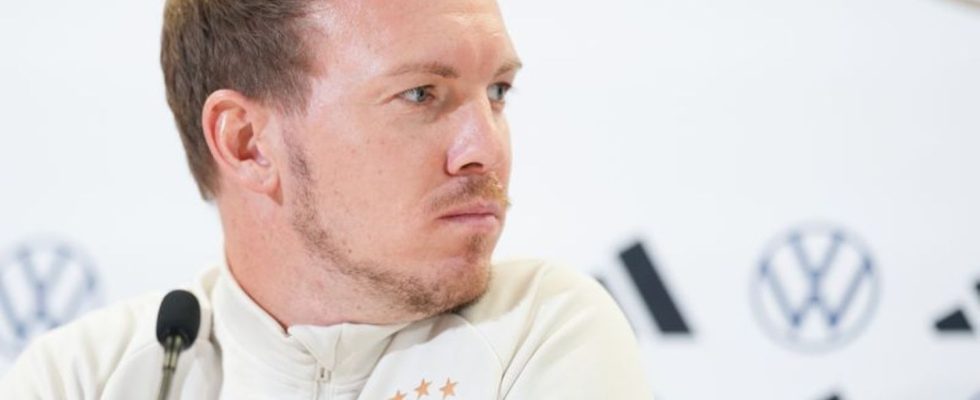National team
Nagelsmann’s European Championship Roulette: Newbie crush meets retro duo
Relies on many new faces in the German national team: national coach Julian Nagelsmann. photo
© Eva Manhart/apa/dpa
Can this work well? Three months before the European Championship kicks off, Julian Nagelsmann names a final test squad that raises many questions. Momentum instead of experience should stop the crisis in time.
Manuel Neuer and Toni Kroos will have to look around quite a bit when they return to the national football team. New faces here, new faces there and also the relatively new national coach Julian Nagelsmann, who is more or less dissolving hierarchies in Germany’s most important football team at a piquant time with a historically unique radical action. Less than 100 days before the home European Championship kicks off, everything at the DFB team will actually be set to “zero”, as Nagelsmann had already threatened.
A whole swarm of newcomers in, a good dozen European Championship aspirants including Mats Hummels and Leon Goretzka out? Nagelsmann will have to explain the looming extent of the personnel cuts when he announces his 20-man squad for the symbolic March double test at the DFB campus in Frankfurt on Thursday (2 p.m.) – exactly three months before the opening game in Munich against Scotland announced.
The final endurance tests with the classics against vice-world champions and tournament favorites France on March 23rd in Lyon and three days later against arch-rivals Holland make Nagelsmann a spicy candidate roulette. With an uncertain outcome.
Völler is monitoring the situation
Defeats would put Nagelsmann himself in trouble. The memories of the precarious mood after the 1:4 disaster in Italy before the home World Cup in 2006 would quickly come back. “The national coach gave his nomination some thought,” said sports director Rudi Völler, who is keeping a close eye on developments.
Everyone was forewarned, including the Rio world champions Neuer and Kroos, when Nagelsmann announced serious changes for the first time after the sobering and humiliating defeats against Turkey (2:3) and Austria (0:2). Now it’s getting concrete. More than half of the November squad members could have to watch this time.
The three Stuttgart players Waldemar Anton, Maximilian Mittelstädt and Deniz Undav as well as the new Munich six-man hope Aleksandar Pavlovic were already rumored to be newcomers to the team in a media information competition. Whether Frankfurt’s Robin Koch or debutant Jan-Niklas Beste from 1. FC Heidenheim might invite other players without significant international merits is almost irrelevant. The national team has never been so shaken up so close to a major tournament – especially as hosts.
Celebrity prank list
Possibly more serious for the team structure than the many newcomers who are allowed to audition for their European Championship chance is the prominent strike list, which, in addition to Goretzka, Robin Gosens and Kevin Trapp, could supposedly also include a complete Dortmund block around Niklas Süle and Hummels. Warning shot or DFB exit? These interpretations are up for grabs.
But Nagelsmann’s message is clear: no one can and should be sure. He had already postulated the “here and now” as a performance mantra after he took up his post in September. Now he’s taking his love of momentum to the extreme. The Munich role reversal with Pavlovic, who could also play for Serbia instead of Goretzka, makes this clear.
But of all people, Hummels – who was noisily eliminated by then national coach Joachim Löw in March 2019 and quickly reactivated by Nagelsmann as the king’s personnel with the second comeback. Memoir or siding? Is the national coach hurtling into the European Championship countdown? When he took office, he praised the 35-year-old BVB defender as a leading figure who could “understand and carry forward” his ideas.
Returnee Kroos as a factor
This task now falls to Neuer, but especially Kroos as a retro duo. The Real star, who was able to announce his return to the DFB and tournament nomination in February, is still strong in opinion and athletically at the top at 34. But is he also accepted as a guy? How the football strategist, who shares an advisor with Nagelsmann, moves in the DFB circle will be closely watched by many old and new colleagues. A key personality associated with this is Ilkay Gündogan, the quiet captain. Will he also wear the black, red and gold captain’s armband at the European Championships or will it go back to the 37-year-old Neuer?
Nagelsmann’s plan with Bayern veteran Thomas Müller as another Rio icon is also unclear. Does the national coach have use for him? In the photo for the announcement of a fan campaign, the 34-year-old can be seen laughing next to Nagelsmann on the DFB homepage. Coincidence or evidence?
Neuer and Kroos return at the moment when key protagonists of the 1995/96 generation receive the acknowledgment for their poor DFB record for years. Goretzka wasn’t there, Süle and Julian Brandt probably weren’t there either, Leroy Sané was banned after his assault in Vienna and Joshua Kimmich was moved to the position of full-back (as a penalty). To make matters worse for the overall mood of this year, Marc-André ter Stegen could officially find out before the France game that Neuer is planned as Nagelsmann’s number one for the European Championships.
Managing this mixed situation is Nagelsmann’s challenge after his false start as national coach with only one win in four international matches. His self-assessment of the crisis situation in the national team remains unintentionally topical: “I knew that it was difficult, that it was a big task, but also a task that could be mastered.”

